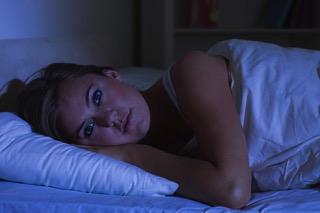
It seems almost everyone has insomnia these days, including, possibly, you. People either can't fall asleep, they wake up after a few hours of sleep and can't go back asleep, or they aren't able to sleep deeply. The reasons for insomnia vary from person to person, but it's typically not due to a sleeping pill deficiency.
Instead, the reasons behind insomnia or poor sleep can be startlingly straightforward, although addressing them may take some diet and lifestyle changes.
In this article I'll go over often overlooked issues that cause insomnia and poor sleep. Don't assume a powerful sleeping pill is your only answer. Look at the underlying causes first and address those.
Five things that can cause insomnia
Low blood sugar. Do you wake up at 3 or 4 a.m., racked with anxiety and unable to fall back asleep? That could be caused by a blood sugar crash, which raises stress hormones (hence the anxious wake up). Eating small but frequent meals, never skipping meals, and avoid sugary and starchy foods are important to keep blood sugar stable. Additionally, eating a little bit of protein before bed and at night if you wake up may help.
High blood sugar (insulin resistance or pre-diabetes). Do you fall asleep after meals yet struggle to fall asleep at night? Do you wake up feeling like you've been run over by a truck, but are wide awake at bedtime? It could be high blood sugar, a precursor to diabetes, is driving your primary stress hormone cortisol and keeping you up. A telltale symptom of high blood sugar is falling asleep after meals, especially starchy meals. Minimizing sugary and starchy foods, not overeating, and exercising regularly can help you rewind insulin resistance and sleep better at night.
Too much blue light. Are you staring into a computer, phone, tablet, or TV screen right before bed? If so, you're confusing your body's sleep hormone production. The body recognizes blue light as daylight, which suppresses the production of melatonin, our main sleep hormone. Limiting your exposure to blue light at night can help boost your body's production of sleep hormones. Wear orange glasses two hours before bed, use orange bulbs in your nighttime lamps, and limit your evening screen time to boost melatonin.
Inflammation. If you are chronically inflamed it drives up your stress hormones, which can keep you awake. This is particularly true if you're experiencing inflammation in your brain, which can cause anxiety. One of the most common causes of chronic inflammation is an immune reaction to foods, especially gluten, dairy, eggs, and various grains. Screening for undiagnosed food sensitivities and an anti-inflammatory diet can help you hone in on what's causing your insomnia or poor sleep.
Hormone imbalances. Hormone imbalances can significantly impact sleep. Low progesterone, which is a common symptom of chronic stress, heightens anxiety and sleeplessness. An estrogen deficiency in perimenopause and menopause has been shown to increase anxiety, insomnia and sleep apnea. In men, low testosterone is linked with poor sleep and sleep apnea. Also, low hormone levels can be inflammatory to the brain, increasing anxiety and insomnia.
Many things can cause insomnia and poor sleep, however these are some of the more common. While you are addressing the underlying factors of your sleep issue, you can aid your ability to sleep with safe and natural compounds, depending on the mechanism. Ask my office for more advice.



Latest from the Blog
Navigating Tick-Borne Infections: Ozone Therapy as a Holistic Approach to Lyme Disease and Co-Infections
April 8, 2024Tick-borne infections, particularly Lyme disease and its co-infections, pose a significant health challenge for individuals worldwide. Characterized by complex symptoms and often elusive diagnoses, these infections can wreak havoc on the body’s immune system and overall well-being. Amidst the conventional treatments available, there’s a growing interest in exploring complementary therapies such as ozone therapy within […] Read more
Latest from the Blog
Unlocking Hope: Ozone Therapy as a Complementary Approach to Cancer
Cancer remains one of the most challenging health issues of our time, affecting millions of lives worldwide. While conventional treatments such as chemotherapy and radiation therapy have made significant strides in cancer management, many patients seek complementary approaches to enhance their treatment outcomes and alleviate side effects. Ozone therapy, a promising modality in functional and […] Read more